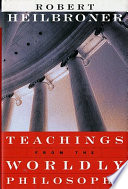 | John Cunningham Wood - 1996 - 462 páginas
...Smith's Theory of moral sentiments, and indeed the opening pages of that book contain this remark: As we have no immediate experience of what other men feel, we can form no idea of what other men feel, but by conceiving what we ourselves should feel in the like situation. Though... | |
 | Robert L. Heilbroner - 1996 - 376 páginas
...greatest ruffian, the most hardened violator of the laws of society, is not altogether without it. As we have no immediate experience of what other men...what we ourselves should feel in the like situation. Though our brother is upon the rack, as long as we ourselves are at our ease, our senses will never... | |
 | Julia A. Stern - 2008 - 324 páginas
...workings of vision and imagination, the ability to leave oneself behind in order to take another's part: As we have no immediate experience of what other men...what we ourselves should feel in the like situation. Though our brother is upon the rack, as long as we ourselves are at our ease, our senses will never... | |
 | Jennifer A. Herdt - 1997 - 322 páginas
...affirming, like Johnson, that sympathy involves imagining what we would feel in the situation of another: 72 [A]s we have no immediate experience of what other...what we ourselves should feel in the like situation. Though our brother is upon the rack, as long as we ourselves are at our ease, our senses will never... | |
 | Roy Porter - 1997 - 304 páginas
...appeared.' Smith's own opening chapter lets us see why empiricism led to this emphasis on 'sympathy'. 'As we have no immediate experience of what other...no idea of the manner in which they are affected. hut hy conceiving what we ourselves should feel in the like simation.' Sympathy rescues us from solipsism... | |
 | Elizabeth Barnes - 1997 - 176 páginas
...sympathize with them. However, since Smith has also claimed that we can never know what someone else feels "but by conceiving what we ourselves should feel in the like situation," it follows that our only hope of discerning another person's judgment is by putting ourselves in ft... | |
 | Luc Boltanski - 1999 - 272 páginas
...Setting, Frankfurt-on-Main Adam Smith's Science of Morals, Verlag Peter Lang, l986. 8. Campbell, p. 95. 9. 'As we have no immediate experience of what other...what we ourselves should feel in the like situation' (The Theory of Moral Sentiments, p. 9); 'Every faculty in one man is the measure by which he judges... | |
 | Charles L. Griswold - 1999 - 430 páginas
...could not possibly experience. Let us listen again to another of Smith's preliminary formulations: As we have no immediate experience of what other men...what we ourselves should feel in the like situation. . . . Neither can that faculty [of imagination] help us to this any other way, than by representing... | |
 | Adam Smith - 1982 - 582 páginas
...doing this, we stand in the relation of bystander or spectator, and Smith was careful to argue that, 'As we have no immediate experience of what other...what we ourselves should feel in the like situation.' (Iii2.) An expression of sympathy (broadly defined) for others thus involves an act of reflection and... | |
 | Patricia Hogue Werhane - 1999 - 166 páginas
...fortune of others" (Ii1.1). One of these "principles" is sympathy. At the same time, Smith says that "[a]s we have no immediate experience of what other...what we ourselves should feel in the like situation" (1759/1976,1.1.2). In Smith's technical use of the term, sympathy is neither empathy nor any other... | |
| |